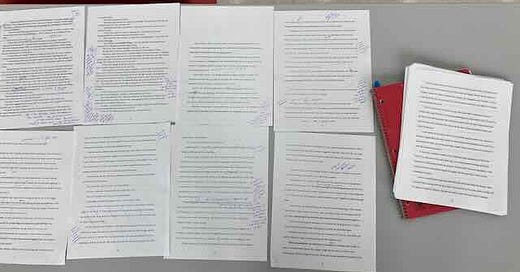Let’s get real—it’s the holidays, a time of year when most of us walk around with our hair on fire. There are gifts to buy, cards to send, and loads of events to attend—a shit ton to do, during the season when our bodies want to rest. Then there’s the travel, the sleeping in strange beds, and the general pressure for things to be Beautiful and Special. Simply put, this time of year can be fucking exhausting.
So why is this asshole (picture me pointing at myself with two thumbs) going to talk to you about writing? What kind of thoughtless bitch waltzes into the mania of the holiday season and says, Let me add one more thing to your to do list: please also work on your novel / stories / essays / poems. Is she high? Is she out of her godforsaken gourd? (No and yes, though the latter has always been a little true.)
Before you hit the delete key, allow me a moment to specify: I’m not asking for much here. I don’t expect you to find hours of silence and freedom to rework or draft a chapter. What I want to talk about today is what you can do in ten or twenty minutes. What I want to talk about today is the little bits of effort that can add up to a lot of progress.
Most of the writing I get done this time of year is not monumental. For the last two weeks, I have been tinkering with a few scenes—adjusting tone, reworking dialogue, filling in description, gesture, and backstory. It doesn’t feel like much, but it isn’t small and it isn’t meaningless, not at all.
First off, touching the project matters. Some days, all we have time and mental energy for is to open the file and look at it for five minutes. Guess what? That counts as writing. Some days, when we have a little more space, we might do a little more. There’s a new scene I need to write, that goes late in the second act. I’ve been drafting it a few sentences at a time. And I’m already halfway there.
I know what you’re thinking: That’s all fine and good, but you can’t really write a novel that way. I don’t like to say this, but sometimes it needs to be said: You’re wrong. You can write a novel that way. A book, a memoir, a collection of short stories, a poem—all work large and small is produced sentence by sentence, word by word. If you don’t believe me, please believe Stephen King, who writes this in the introduction to the unabridged version of The Stand:
“When asked “How do you write?” I invariably answer, “One word at a time,” and the answer is invariably dismissed. But that is all it is. It sounds too simple to be true, but consider the Great Wall of China, if you will: one stone at a time, man. That’s all. One stone at a time. But I’ve read that you can see that motherfucker from space without a telescope.”
—Stephen King
I still plan to finish a draft of my novel by the end of this year. And a voice in my head keeps reminding me that in order to finish a draft, I’m going to have to actually write the ending. Right now, the book has no final scene/closer. Right now, I’m still a little fuzzy on what that’s going to look like.
But I’m trusting the process, and my attention. On the surface, the work I’m doing in Act II simply looks like writing needed sentences and deleting unneeded ones. But what I’m really doing is spending time with my main characters in the middle of the book, when their guts are all churned up by the inciting incident and they’re in the midst of change. I’m studying that change, and the many micromovements in each character it spurred. It’s those micromovements—the slightly different choice, the subtly shifted motivation or desire—that will eventually lead me to the ending.
Don’t believe me? Once again, Stephen is here to back me up:
“I’ll spare you the story of how The Stand came to be written—the chain of thought which produces a novel rarely interests anyone but aspiring novelists. They tend to believe there is a “secret formula” to writing a commercially successful novel, but there isn’t. You get an idea; at some point, another idea kicks in; you make a connection or a series of them between ideas; a few characters (usually little more than shadows at first) suggest themselves; a possible ending occurs to the writer’s mind (although when the ending comes, it’s rarely much like the one the writer envisioned)…
That’s it. It’s not magic. You chase the shadows and ideas down underlit paths and eventually find some light and discovery. At some point in the next few weeks, the possible ending will occur in my mind. I will write it down. My book will have an ending. It won’t be the real ending—the actual way the book ends will not materialize for a half-dozen more drafts. But every pass at the ending will show me something. Each time I go back over it, I’ll notice something that doesn’t work, that needs to be recast. So I will make that change, and another, and another, each time getting closer to that true and real ending. The only way to get to the end is to write your way there, sentence by sentence.
I call this nosing the boulder forward. Every inch we advance adds up. It’s not easy—that boulder is big and it is heavy. But our imaginations are big too, and more powerful than we think.
So here’s my prayer, my blessing, my urging, my gentle invitation to you during the remaining weeks of this tire fire of a year: write. Just a tiny little bit. Carry that notebook around. Open the file. Try your hand at a few sentences. Delete some sentences you know aren’t doing much of anything. Show up and see what happens. Nose that boulder forward.







Thanks so much for the shout out, Julia!
I appreciated this newsletter as I'm thinking about my own work. This was my favorite part: "But what I’m really doing is spending time with my main characters in the middle of the book, when their guts are all churned up by the inciting incident and they’re in the midst of change. I’m studying that change, and the many micromovements in each character it spurred. It’s those micromovements—the slightly different choice, the subtly shifted motivation or desire—that will eventually lead me to the ending." -- A great reminder. It's so comforting to know that everything we need to know about the ending is already in the text. We just have to discover it!
Have you read The Stand? It's one of my top 3 favorite Stephen King novels. I recommended it to someone in my writing group. She said it was "okay." (Okay??? Okay!!!) I subsequently stopped recommending books that are over a thousand pages long.